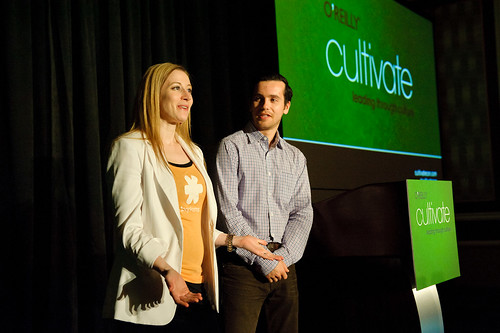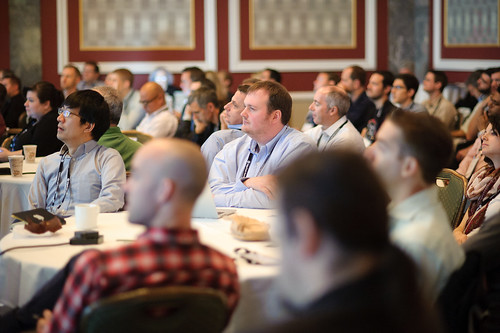Last week I had the pleasure of co-chairing Cultivate. The conference was one-day event focused on technology and leadership.

The Backstory
The original idea for the conference came from my co-chair, Eli Goodman, who wanted a place where like-minded folk could discuss some of the challenges, successes, and experiments that come along with leading technical teams. I have been super passionate about this topic since I started my career as a bad manager, and I have had to work hard to build the skills necessary to lead groups of highly intelligent and opinionated people.
When we were planning the conference, we thought about all sorts of ways we could shake things up with format – panels, structured networking sessions, or even shorter/longer talks. In the end, though, we decided it was most important to have fabulous speakers with compelling messages, so we stuck to a typical conference format (45-minute slots) and just let people do their best work. The only thing we did differently was adding a closing networking event and morning yoga session to get things started, both of which were quite positively received.
I was so worried our speakers would overlap with one another’s topics, but thankfully each person had a clearly different message, style, and, when put together, they all added up a day where you couldn’t leave without learning something new.
What I Learned…
Besides the experience of co-chairing in and of itself (MC’ing an event is harder than you might imagine!), below are some of my favorite lessons from each of the talks:
Tim O’Reilly, O’Reilly Media: “How I Failed”
Tim talked about lessons learned from failures while building O’Reilly Media. I had never met Tim prior to this event, and one of the things that really impressed me was his clear desire to make the world a better place.
In his talk, there were several times that the things he said about his perspective left me struck by what a great person he must be in real life. For example, he talked about how initially he only wanted to hire unemployed people – this was because he felt like he would be helping the economy and not poaching from other companies.
You can read a lot of the lessons from his talk in his post (which is worth reading).
My favorite one was when he talked about hiring people better than you. This is something you always hear, but that many of us forget when it’s actually time to make a hire. When I first started my company and was looking to hire a CTO, for example, I thought I could hire someone I could just grow into the role. In many ways, when you have strength in one area, you assume you can compensate for other people (“I’ll handle that”) – but the reality is that if you are doing your job, you won’t have time. Leadership means learning to let go of your specialties and hiring other amazing people to fill your shoes.
Elaine Wherry, meebo: “Cracking the Culture Code”
Elaine talked about her time at Meebo and some of the lessons she learned as a founder, creating a culture and scaling it with the organization. When she was talking, one thing that really impressed me was the way she thought about benefits. She used the example of free food and had a slide that talked about why each company that has free food does it, and how it fits with their culture.
One of the more interesting revelations I had during her talk wasn’t about benefits or culture at all actually, but about what drives those things: the market. You have to build and create something people want, and to do that well, you need vision and data (in support of that vision). So first, you have to have your vision, and only then can you derive your culture (and benefits) from that vision. This method helps align everyone in a way that has the greatest chance of success.
And by the way – Elaine has a great blog with lots of great articles too if you want to learn more.
Patrick Collison, Stripe: “Transparency in Email”
Patrick spent his time talking about Stripe’s email transparency and how these policies percolate through their culture. He had lots of interesting insights and ideas, and good stories from employees on what they liked about this level of transparency and openness.
In listening to the talk, it really reinforced for me how important it is to give employees the chance to see and experience other parts of the business. People like knowing what is going on in their company, and gaining exposure to legal, marketing, and other areas is a great way to create a business savvy workforce (so they understand not just what they do, but why they do it).
One great tip he shared too, which is definitely worth adopting for startups, is to invite one person to come to each board meeting and take notes. It is a great way to give visibility to employees, recognize work well done, and reinforce company values. Smart.
Scott Chacon, Github: “Leading from First Principles”
As one of the founders of Github, Scott shared some of their lessons around culture. Scott talked about “First Principles”, which is a term from philosophy or physics that emphasizes the focus of identifying the actual problem first, and then proceeding to the solutions next.
This concept really resonated with me, because it is so easy to do things “because that is how other people do them”, or “that is how things were done in the past” – but really the key to solving the root cause is to identify the first principles and then work up to a solution.
Scott also shared the Github org chart, which – instead of a traditional hierarchy – looked more like a neural network with clusters of responsibility. Pretty interesting stuff.
Hiten Shah, CrazyEgg / KISSmetrics: “How to Create a Culture of Shipping Product Continuously”
Hiten spent his time talking about building the right product for your customers. He had a lot of great ideas in his talk (and his slides were awesome) but perhaps the biggest ideas were about methods to build the right product as a team.
Anyone who has led a product definition effort in a company knows how challenging it can be to drive consensus – when it comes to design, everyone seems to have an opinion. Hiten talked through some ways to help drive progress and ship, but also how to leverage the fact you have a whole bunch of smart people working towards the same goal as part of the process.
He shared insights about small teams (a la Amazon’s two pizza teams), how to use cauldrons (a brainstorming technique from Apple), and setting up a golden motion in your product development process with iteration and feedback.
Patty McCord, Patty McCord Consulting: “Leveraging Logic as a Leader”
Patty was amazing to meet in person. Her talk was also incredibly insightful, because she has so much experience and knowledge running HR, and she has coached leaders from many successful companies like Netflix. In fact, her talk was the only one that had applause throughout because she delivered so many statements that everyone thinks but few people have the courage to say.
A great example of this was when she was talking about Performance Improvement Plans (PIPs for short). She said that we should get rid of them entirely. Instead of PIPs, she said, we should eliminate the position when someone isn’t working out, and open an new one – if they aren’t able or willing to fill the new role, then just give them severance and let them leave gracefully. This ends up better for everyone than the dreaded weekly meeting, which just builds resentment between employee and manager.
It was hard to listen to her talk and not reflect on your own “best practices” afterward.
Michael Lopp, Palantir: “I Hate Meetings”
Michael is one of my favorite speakers because I tend to agree with him on most things. He gave a talk on meetings, why they are necessary and how to make them better (and this is something close to my heart since I wrote a post on how to improve meetings recently, too).
The biggest takeaway from his talk, though, is also summarized in his blog post on one on ones, in which he emphasized how important these meetings are to building rapport and connecting with people. He also talked about why they shouldn’t be status meetings, and that as a leader, it is your job to own the agenda and make these meetings awesome.
My Analysis
Overall I think the conference was a success. Each speaker offered helpful lessons and did so in an insightful way.
If we did it again, though, I think going deep into a specific topic would be really useful. For example, how to connect with people at work and talking about managing up better. We could also talk about managing down (like being awesome at one on ones) and have executive coaches or psychologists deliver some of the content too. There are so many tracks you could have in the conference – things about designing products, and process hacks, or even forward looking technology trends – that it would be great to have the ability to go really in depth with each one.
The day was definitely a great experience and well worth the time, and I was honored to be a part of it.

